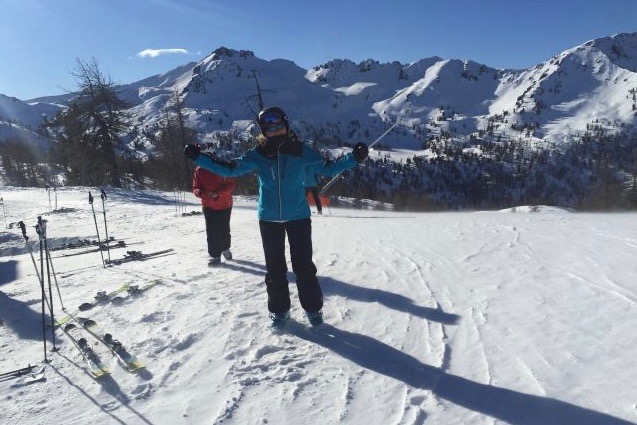With a mood improvement as a bonus.
I spent last week on a skiing holiday. The snow was fresh, sun was shining: the conditions that allow the way of skiing one really loves. For me it meant: quite quick descents with large giant curves. This gave me the feeling similar to swimming or flying; freedom and the view of the whole world around me. Unfortunately from time to time I was thrown out of this idyll by other skiers: the skiers who I found on the collision course with me. Initially I started to get frustrated: by those who ski very quickly downwards without looking at anybody around and by those who ski sideways across the slope. When I realized my reaction I started to look at the other skiers from a different perspective.
I started to observe their posture, way of moving, felt mood.
I don’t mean their skiing technique. I mean their body balance and the effectiveness of their skiing.
So, here are some of my observations. Some skiers were solidly grounded on their legs, focused on their skis and skiing evolutions. They usually run according to their own plan and imagination regardless of their speed and skiing skills. They were not used to adapt to the changing slope conditions. Others kept their centre of the body weight high: often up to their arms. They looked less stable and they were losing their balance more frequently. They seemed to have less pleasure and more sense of anxiety or fighting against the hill. Some others strongly bent forward, focused on the final goal or on their way to be the best or the quickest. Some others ski majestically with their weight on the backside, observing everything and everybody carefully and prudently.
Do we have similar approaches in our daily life, too?
I would assume that yes – we have. Why should it be different? Our body and our muscles work and react in similar way in different situations requiring effort and concentration. Is the approach of “perfect in technique” reflected in the daily routines? Or maybe “ quicker and better than others”? Or “easy, without unnecessary effort”?
I decided to check, what influence the change of my usual ski posture into a balanced, physically centred one has on my skiing. (Note for those who don’t ski: skiers are usually told to ski leaning forward with bent knees).
How did I make it?
I lowered my body weight to the lower abdomen. I relaxed arms, neck and all unnecessarily contracted muscles. I started to strongly feel the body weight on my feet. At the same time I pulled my chest up along the spine. I relaxed my eyes, allowing them to see widely the slope and the horizon. I relaxed my jaws, allowing deeper breath. I distributed my body weight evenly between front and back of my feet. I moved my attention from my thoughts and planning to the physical body centre. This allowed me to feel my body and at the same time to perceive the environment. And I moved downwards. Of course my body was thrown out of this centre with every curve and slope roughness, but I was trying to come back to centre again and again.
The effect was just incredible: I had a feeling of strength, stability and lightness at the same time.
And I have broken my speed record without any additional effort. I have got as well an additional bonus: an incredible feeling of joy and openness: nobody was disturbing me on the slope anymore.
Can we get such a result in daily life?
I can assure you that yes, we can. The physical balance in a magical way influences our emotional balance and our mood. Actually there is no a magic here but pure biology. Our limbic system that is responsible for our emotions and moods directly activates our muscles, preparing them for a specific activity. One of biology rules say: no action without reaction. So, the limbic system gets signals directly from the muscles. Physical balance induces emotional balance and influences our moods. The only “ but” is that it is effective similarly to muscles training: we need to practice it regularly.
So, maybe it is worth to try this during the time of making sport you practice? You run, jog, practice yoga, tennis or pool? Maybe you lift weights in a gym? Or perhaps you dance? Try to feel your body and centre it around your body centre in 3 dimensions. Check how it influences your physical performance. Observe as well your mood during and after the training.
Does it work? Yes it works !
Share your experience.





Leave A Comment